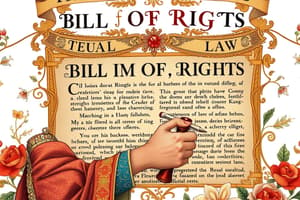Podcast
Questions and Answers
What do the first ten amendments to the United States Constitution collectively represent?
What do the first ten amendments to the United States Constitution collectively represent?
- The Articles of Confederation
- The Bill of Rights (correct)
- The Declaration of Independence
- The Emancipation Proclamation
Which amendment protects an individual's right to bear arms?
Which amendment protects an individual's right to bear arms?
- Second Amendment (correct)
- First Amendment
- Fourth Amendment
- Fifth Amendment
What does the Third Amendment prohibit?
What does the Third Amendment prohibit?
- Double jeopardy
- Housing soldiers without consent (correct)
- Unreasonable searches and seizures
- Excessive bail
Which amendment requires a warrant for searches?
Which amendment requires a warrant for searches?
The Fifth Amendment provides which of the following rights?
The Fifth Amendment provides which of the following rights?
What does the Sixth Amendment guarantee?
What does the Sixth Amendment guarantee?
What is prohibited by the Eighth Amendment?
What is prohibited by the Eighth Amendment?
Which amendment states that individuals may have rights not specifically listed in the Constitution?
Which amendment states that individuals may have rights not specifically listed in the Constitution?
The Tenth Amendment asserts that powers not granted to the federal government are reserved for whom?
The Tenth Amendment asserts that powers not granted to the federal government are reserved for whom?
Which of the following best describes the purpose of the Bill of Rights?
Which of the following best describes the purpose of the Bill of Rights?
Flashcards are hidden until you start studying
Study Notes
Overview of the Bill of Rights
- The Bill of Rights consists of the first ten amendments to the United States Constitution.
- It is a crucial segment of the Constitution, which includes seven articles and a total of 27 amendments.
Importance of the Bill of Rights
- Aimed to guarantee and protect individual freedoms and liberties.
- Establishes limitations on government power, ensuring that rights not explicitly granted to the government are retained by the people.
Definition of Rights
- Rights are defined as freedoms and protections that individuals inherently deserve.
- The Bill of Rights could also be referred to as the "Bill of Freedoms."
The Ten Amendments
-
First Amendment: Guarantees freedoms of speech, religion, press, assembly, and the right to petition the government.
-
Second Amendment: Protects the right to bear arms, meaning to carry weapons.
-
Third Amendment: Prohibits the government from forcing individuals to house soldiers without consent, addressing grievances from the Revolutionary War.
-
Fourth Amendment: Protects against unreasonable searches and seizures; a warrant from a judge is required for searches.
-
Fifth Amendment: Provides the right to remain silent in court and ensures fair treatment; introduces the phrase "I plead the fifth."
-
Sixth Amendment: Guarantees a speedy and public trial, the right to a lawyer, and the right to confront witnesses.
-
Seventh Amendment: Affirms the right to a jury trial in civil cases, where decisions are made by ordinary citizens rather than a judge.
-
Eighth Amendment: Prohibits excessive bail and cruel and unusual punishment, ensuring fairness in legal proceedings.
-
Ninth Amendment: States that individuals possess rights not explicitly listed in the Constitution, allowing for unenumerated rights.
-
Tenth Amendment: Asserts that powers not delegated to the federal government are reserved for the states or the people.
Conclusion
- The Bill of Rights is an essential component of the Constitution, designed to uphold personal freedoms and limit governmental authority.
- Encourages informed engagement with individual rights as fundamental to American democracy.
Overview of the Bill of Rights
- The Bill of Rights comprises the first ten amendments of the U.S. Constitution.
- It plays a crucial role in the Constitution, which includes seven articles and a total of 27 amendments.
Importance of the Bill of Rights
- Guarantees and protects individual freedoms and civil liberties.
- Imposes limitations on government power, ensuring ungranted rights remain with the people.
Definition of Rights
- Rights refer to the inherent freedoms and protections due to individuals.
- The Bill of Rights can also be known as the "Bill of Freedoms."
The Ten Amendments
- First Amendment: Ensures freedoms of speech, religion, press, assembly, and the right to petition the government.
- Second Amendment: Safeguards the right to bear arms, allowing individuals to carry weapons.
- Third Amendment: Forbids housing soldiers in private homes without consent, reflecting concerns from the Revolutionary War.
- Fourth Amendment: Shields against unreasonable searches and seizures; mandates a warrant issued by a judge for searches.
- Fifth Amendment: Affords the right to remain silent in court; includes protection against self-incrimination and ensures fair legal treatment.
- Sixth Amendment: Guarantees swift and public trials, access to legal counsel, and the right to confront witnesses.
- Seventh Amendment: Establishes the right to jury trials in civil cases, empowering ordinary citizens in decision-making.
- Eighth Amendment: Prohibits excessive bail and cruel or unusual punishments, promoting fairness in legal processes.
- Ninth Amendment: Indicates the existence of rights beyond those explicitly mentioned in the Constitution, allowing for unenumerated rights.
- Tenth Amendment: Declares that powers not entrusted to the federal government are reserved for the states or the people.
Conclusion
- The Bill of Rights is vital for safeguarding personal freedoms and restraining governmental authority.
- It encourages active engagement with individual rights, which are fundamental to American democracy.
Studying That Suits You
Use AI to generate personalized quizzes and flashcards to suit your learning preferences.




